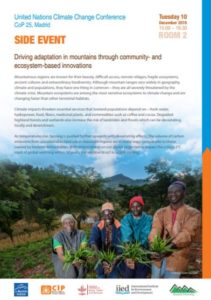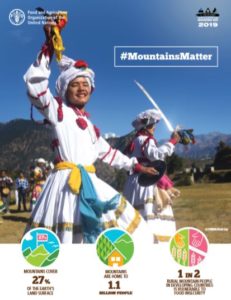
Mountain ecosystems are changing faster than other terrestrial habitats, and climate impacts threaten essential services that mountain and lowland populations depend on—fresh water, hydropower, food crops, medicinal plants, and commodities such as coffee and cocoa. Degraded highland forests and wetlands also increase the risk of landslides and floods which can be devastating locally and downstream. As temperatures rise, farming is pushed further upwards with devastating effects. The volume of carbon emissions from unsustainable land use in mountain regions are in many ways comparable to those caused by lowland deforestation. With temperatures on our planet projected to bypass the critical 2°C mark of global warming within 30 years, the window to act is rapidly closing.
This side event will highlight proven solutions from different mountain contexts and provide a forward-looking perspective on opportunities to effect positive change. Examples will be drawn from cases that build on collective action and interactions involving ecosystem and bioeconomy innovations. The session will also look at national policies and cooperation approaches that focus on sustainable mountain development interventions.
| Program | Speakers | Moderators |
| Inspire talks | Jorge Recharte, The Mountain Institute
Yuka Makino, The Mountain Partnership Secretariat, FAO Yiching Song, Chinese Center for Agriculture Policy |
Yuka Makino
The Mountain Partnership Secretariat FAO |
| High-level panel | Gabriel Quijandría Acosta; Deputy Minister of Strategic Development of Natural Resources, Ministry of Environment, Peru
Marc Pons; Director, Andorra Innovation Hub |
Ali Raza Rizvi
International Union for Conservation of Nature |


